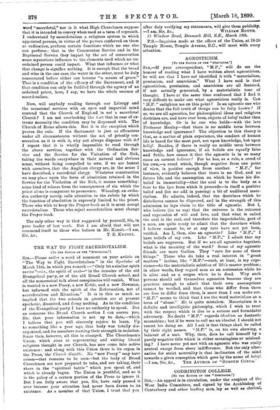AGNOSTICISM.
[To THZ EDITOR OP THZ "SPECTATOR:1 SIR,—If your correspondent, "M.P.," will do me the honour of reading what I have written about agnosticism, he will see that I have not identified it with "materialism, pessimism, and anarchism." What I have said is that agnosticism, pessimism, and anarchism are all fostered,
if not actually generated, by a materialistic tone of thought. I have at the same time confessed that I find it very difficult to make out what agnosticism really is. Can
'M.P." enlighten me on this point? Is an agnostic one who denies that the full truth of things can be fully known? If so, we are all agnostics, for philosophical ideas and religious doctrines are, and have ever been, objeets of belief rather than of knowledge. Or is he one who holds—with the late Professor Huxley—that there is no middle term between knowledge and ignorance? The objection to this theory is that, as a matter of plain experience, the conduct of human life is based for the most part, not upon knowledge, but upon belief. Besides, if there is really no middle term between knowledge and ignorance, if all beliefs are equally false and futile, how comes it that the agnostic is in so many cases an earnest believer? For he has, as a rule, a creed of his own,—a creed which, though negative from one point of view, is positive enough from another. "M.P.," for instance, evidently believes that there is no God, and no future life, and the assumption on which he bases his dis- belief in immortality—that the soul is to the body as a tune to the lyre from which it proceeds—is itself a positive belief and (let me add in passing) a bit of undiluted mate- rialism. He admits, indeed, that the doctrines which he disbelieves cannot be disproved, and in the strength of this admission he lays claim to the title of agnostic. But I, who believe (let us say) that the universe is the outcome and expression of will and love, and that what is called the soul is the real, and therefore the imperishable, part of a man, am quite ready to admit that the doctrines which I believe cannot be, or at any rate have not yet been, verified. Am I, then, also an agnostic ? Like "M.P.," I have beliefs of my own. Like "M.P.," I admit that my beliefs are unproven. But if we are all agnostics together, what is the meaning of the word ? Some of my agnostic friends are mere Gallios. They "care for none of these things." Those who do take a real interest in "great matters" incline, like "M.P."—such, at least, is my expe- rience—to the materialistic solution of life's master problem; in other words, they regard man as an automaton while he is alive and as a corpse when he is dead. Why such persons should call themselves agnostics because they are gracious enough to admit that their own assumptions cannot be verified, and that those who differ from them are free to differ from them, is more than I can make out.
seems to think that I use the word materialism as a term of "abuse." He is quite mistaken. Materialism is a definite and intelligible philosophy, which I wish to treat with the respect which is due to a serious and formidable adversary. No doubt "M.P." regards idealism as fantastic moonshine; but if he were to call me an idealist I should not resent his doing so. All I ask is that things shall be called by their right names. "M.P." is, on his own showing, a believer of a sort. Why, then, does he call himself by a purely negative title which is either meaningless or mislead- ing P I have never yet met with an agnostic who was really neutral except from sheer indifference. But the only alter- native for strict neutrality is that inclination of the mind towards a given conception which goes by the name of belief. —I am, Sir, &C., THE AUTHOR OF "SUBSIDE CORDA."






































 Previous page
Previous page